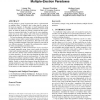Free Online Productivity Tools
i2Speak
i2Symbol
i2OCR
iTex2Img
iWeb2Print
iWeb2Shot
i2Type
iPdf2Split
iPdf2Merge
i2Bopomofo
i2Arabic
i2Style
i2Image
i2PDF
iLatex2Rtf
Sci2ools
SIGECOM
2011
ACM
2011
ACM
Strategic sequential voting in multi-issue domains and multiple-election paradoxes
In many settings, a group of agents must come to a joint decision on multiple issues. In practice, this is often done by voting on the issues in sequence. In this paper, we model sequential voting in multi-issue domains as a complete-information extensive-form game, in which the agents are perfectly rational and their preferences are common knowledge. In each step, the voters simultaneously vote on one issue, and the order of the issues is determined before the process. We call this model strategic sequential voting. We focus on domains with binary issues, so that this process leads to a unique outcome under a natural solution concept. We show that under some conditions on the preferences, this leads to the same outcome as truthful sequential voting, but in general it can result in very different outcomes. We analyze the communication complexity of the corresponding social choice rule. Most significantly, we show several multiple-election paradoxes in strategic sequential voting: the...
| Added | 17 Sep 2011 |
| Updated | 17 Sep 2011 |
| Type | Journal |
| Year | 2011 |
| Where | SIGECOM |
| Authors | Lirong Xia, Vincent Conitzer, Jérôme Lang |
Comments (0)

